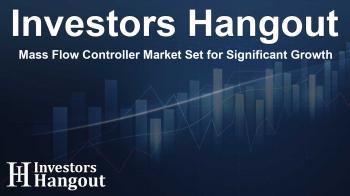Mass Flow Controller Market Set for Significant Growth

Mass Flow Controller Market Overview
The mass flow controller market is on an exciting trajectory, with forecasts suggesting it will reach an impressive valuation of US$ 1.70 billion by 2031. This anticipated growth of 5.8% CAGR from 2025 to 2031 is primarily driven by increasing automation, digitalization, and the rising demand for clean and renewable energy solutions. This burgeoning market is set to be shaped by strategic innovation from manufacturers focused on enhancing efficiency and performance.
Driving Forces Behind Market Growth
Valued at approximately US$ 1.16 billion in 2024, the market for mass flow controllers (MFCs) highlights a growing trend in precise flow control across various industries, including semiconductors, pharmaceuticals, and clean energy. As manufacturing processes evolve, there exists a pressing need for systems that ensure accuracy and reliability in flow control. The emergence of smart IoT-enabled controllers showcases a significant trend in MFC technology. This transition is particularly evident in the development of hydrogen and fuel cell technologies, along with increasing life sciences applications. Continuous innovation and stringent environmental regulations are expected to drive market growth.
The Semiconductor Sector's Demand
The semiconductor industry is a key contributor to the mass flow controller market's expansion. As chip manufacturers increasingly utilize smaller process nodes to improve performance, the necessity for precise gas flow control becomes paramount. MFCs are essential in processes like chemical vapor deposition (CVD), etching, and doping, where accuracy in gas flow can significantly influence product quality. Any variance in gas flow can result in production defects or yield losses that are costly to rectify.
Advancements in Hydrogen Technology
Another critical factor propelling the growth of the mass flow controller market is the shift towards a hydrogen economy. With a global focus on reducing carbon emissions and adopting clean energy sources, green hydrogen is emerging as a viable solution. Here, MFCs play a crucial role in managing gas flow in electrolyzers responsible for separating water into hydrogen and oxygen. This process is vital for various applications, from powering vehicles to producing clean energy.
Geographical Insights
In terms of market distribution, Asia Pacific stands out as the leader, having captured the highest revenue share in 2024. A robust presence of major sectors such as consumer electronics and semiconductors supports this growth. The region showcases immense potential and is poised to register the highest CAGR in the upcoming years, driven by advancements from leading semiconductor manufacturers and its established automotive sector.
Market Segmentation
The global mass flow controller market is categorized by several segments, including type and application. It is segmented into low, medium, and high flow controllers, with the low segment commanding a significant market share in 2024. When analyzing sensor technology, thermal mass flow controllers led the market, emphasizing the need for accurate measurement across various applications.
Competitive Landscape
The mass flow controller market is characterized by intense competition, with key players like Horiba Ltd, Sensirion Holding AG, and MKS Instruments Inc. competing on product quality and technological innovation. Current trends in the industry focus on digitalization, modular designs, and self-learning capabilities to meet the diverse needs of consumers.
Future Outlook and Conclusion
Overall, the mass flow controller market is positioned for substantial growth, driven by industrial expansion and increased research and development efforts. As manufacturers pivot towards developing customized mass flow controllers that emphasize precision and integration with modern technology, extensive opportunities are anticipated. The push for miniaturized and ultra-thin mass flow controllers is also notable, as suppliers vie for market share in an increasingly competitive landscape.
As we progress further into the era of automation and digital innovation, buying power is shifting increasingly into the hands of consumers, enhancing their choices and driving competitive pricing. This dynamic is expected to persist, indicating continued advancement and expansion in the mass flow controller market through to 2031.
Frequently Asked Questions
What is the expected market size for mass flow controllers by 2031?
The mass flow controller market is projected to reach US$ 1.70 billion by 2031.
What are the main factors driving the growth of this market?
Key drivers include increasing automation, digitalization, and the demand for clean energy solutions.
Which sectors are significantly influencing market expansion?
The semiconductor industry and the emerging hydrogen economy are significantly impacting market growth.
What trends are shaping mass flow controller technology?
Trends include smart IoT-enabled systems, digitalization, and focused innovations in flow measurement technologies.
Which regions show the highest market potential?
Asia Pacific is leading, exhibiting strong growth potential due to semiconductor advancements and a robust consumer electronics sector.
About The Author
Contact Evelyn Baker privately here. Or send an email with ATTN: Evelyn Baker as the subject to contact@investorshangout.com.
About Investors Hangout
Investors Hangout is a leading online stock forum for financial discussion and learning, offering a wide range of free tools and resources. It draws in traders of all levels, who exchange market knowledge, investigate trading tactics, and keep an eye on industry developments in real time. Featuring financial articles, stock message boards, quotes, charts, company profiles, and live news updates. Through cooperative learning and a wealth of informational resources, it helps users from novices creating their first portfolios to experts honing their techniques. Join Investors Hangout today: https://investorshangout.com/
The content of this article is based on factual, publicly available information and does not represent legal, financial, or investment advice. Investors Hangout does not offer financial advice, and the author is not a licensed financial advisor. Consult a qualified advisor before making any financial or investment decisions based on this article. This article should not be considered advice to purchase, sell, or hold any securities or other investments. If any of the material provided here is inaccurate, please contact us for corrections.

